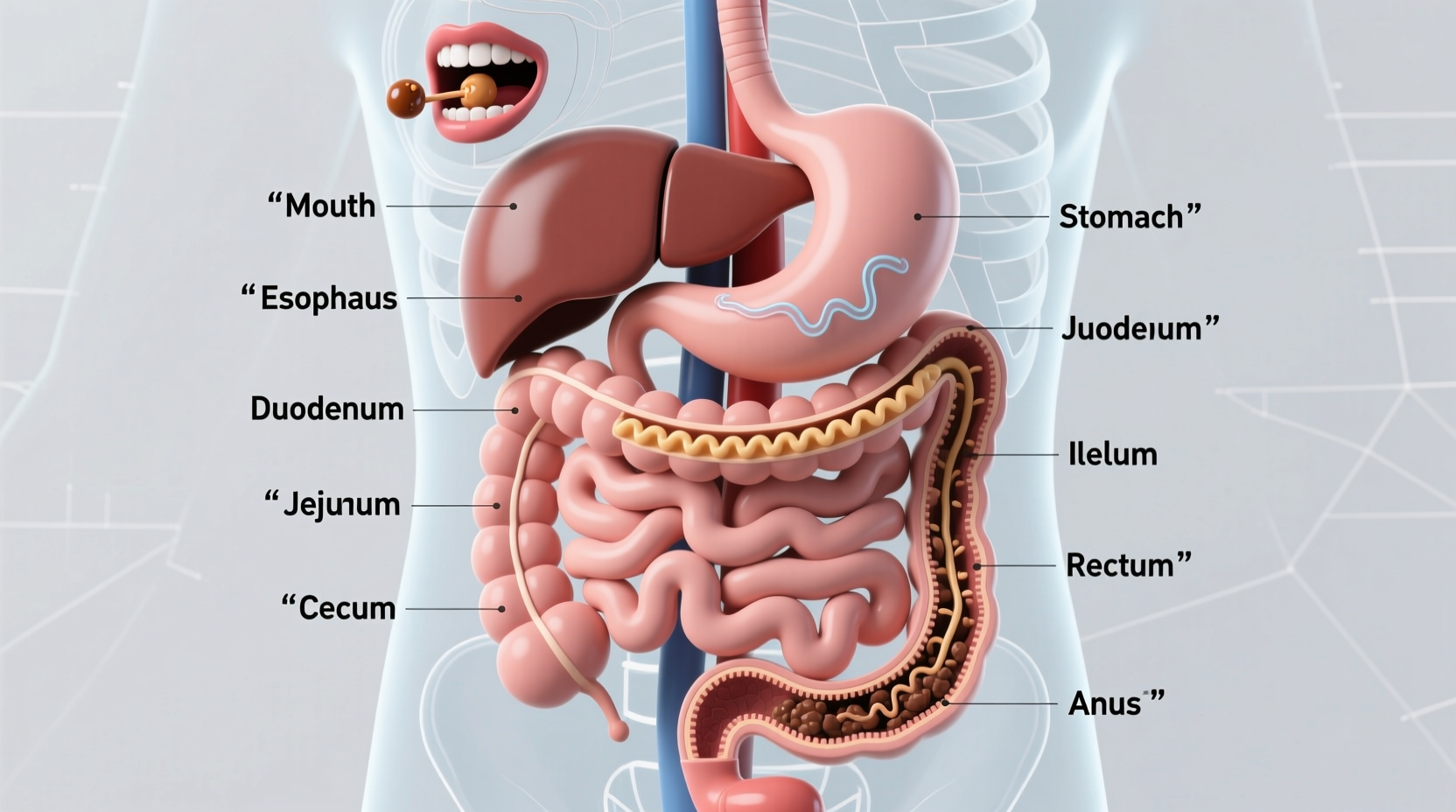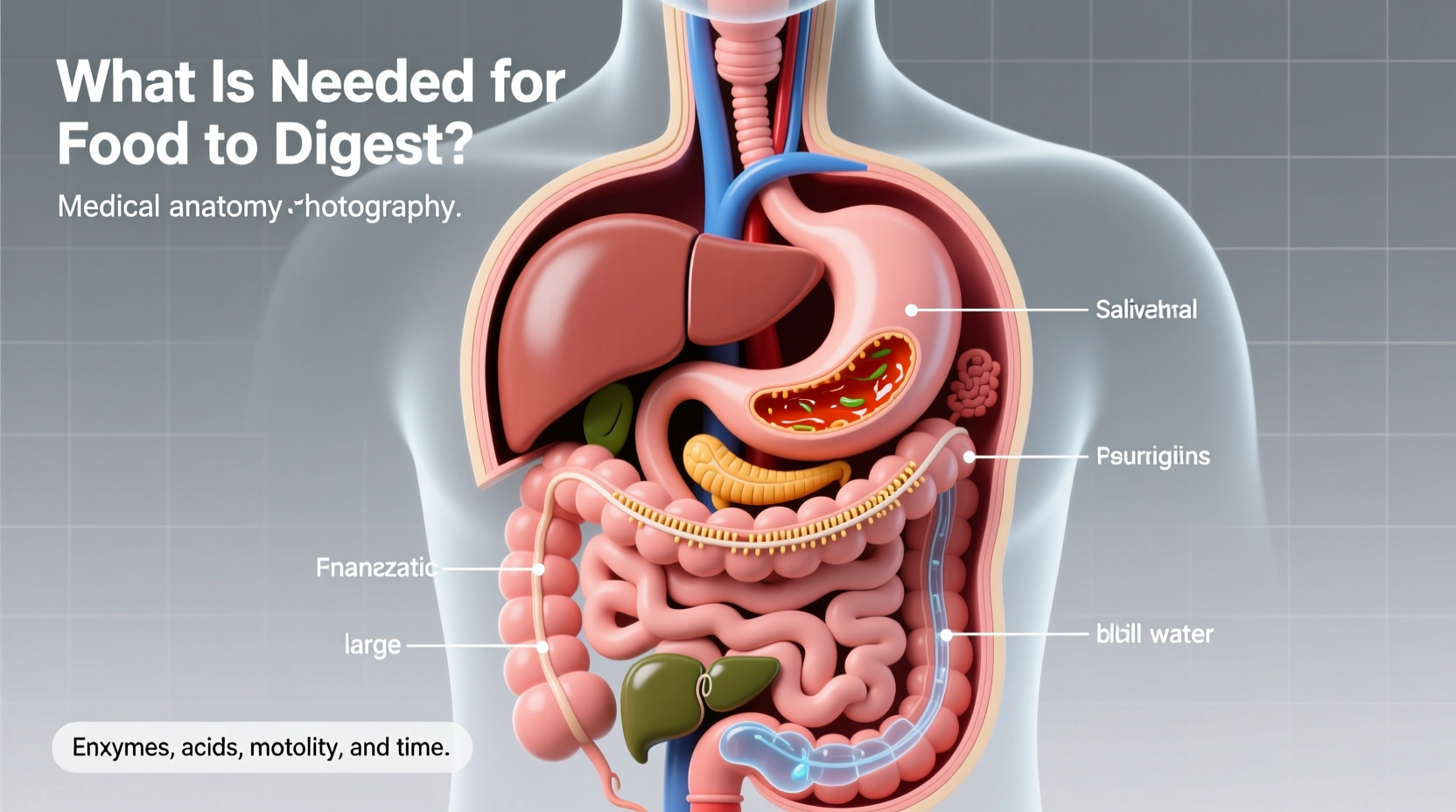The essential components needed for food to digest include digestive enzymes (like amylase, pepsin, and lipase), stomach acid (hydrochloric acid), adequate time (typically 24-72 hours for complete digestion), proper chewing, sufficient water intake, and a healthy gut microbiome. These elements work together to break down food into absorbable nutrients through mechanical and chemical processes along the digestive tract.
Understanding what is needed for food to digest goes beyond simply eating meals. Your body requires specific conditions and components to efficiently transform food into energy and nutrients. Let's explore the science-backed essentials that make digestion possible and how you can optimize this vital process.
Your Digestive System's Key Requirements
Digestion isn't a single event but a complex series of processes requiring multiple components working in harmony. When you ask what is needed for food to digest, the answer involves both internal bodily functions and external factors you can influence.
Digestive Enzymes: The Molecular Scissors
Your body produces specialized enzymes at different stages of digestion, each targeting specific food components:
- Salivary amylase (in mouth) begins breaking down carbohydrates
- Pepsin (in stomach) starts protein digestion
- Lipase (from pancreas) breaks down fats
- Lactase, sucrase, maltase (in small intestine) process sugars
According to research published by the National Institutes of Health, enzyme deficiencies can significantly impair digestion, leading to symptoms like bloating and discomfort. For example, lactose intolerance occurs when the body produces insufficient lactase enzyme.
Stomach Acid: More Than Just Burn
Hydrochloric acid (HCl) in your stomach serves multiple critical functions:
- Activates pepsin for protein digestion
- Kills harmful bacteria in food
- Triggers release of bile and pancreatic enzymes
- Maintains proper pH for enzymatic activity
The Mayo Clinic explains that adequate stomach acid is essential for proper nutrient absorption, particularly for vitamin B12, iron, and calcium. Low stomach acid (hypochlorhydria) affects millions of people, especially as they age.
| Food Category | Stomach Emptying Time | Total Digestion Time |
|---|---|---|
| Water | Immediate | 30-60 minutes |
| Fruits | 20-60 minutes | 1-2 hours |
| Vegetables | 30-50 minutes | 2-3 hours |
| Proteins | 2-4 hours | 3-4 hours |
| Fats | 4-6 hours | 6-8 hours |
The Complete Digestion Timeline
Understanding how long does food take to digest helps explain why certain eating patterns work better than others. The digestive process follows this general timeline:
- Mouth (0-1 minute): Mechanical breakdown through chewing and initial carbohydrate digestion via salivary amylase
- Esophagus (5-10 seconds): Food travels to stomach via peristalsis
- Stomach (2-4 hours): Acid and enzymes break food into chyme; proteins begin digesting
- Small intestine (4-6 hours): Bile and pancreatic enzymes complete digestion; nutrients absorbed
- Large intestine (12-48 hours): Water absorption; gut bacteria process remaining material
This timeline varies significantly based on food composition, meal size, and individual factors. A study from Johns Hopkins Medicine notes that high-fat, high-protein meals can take up to 72 hours to fully process through the digestive system.

Factors That Impact Digestion Efficiency
Several elements influence what slows down digestion process or enhances it. Understanding these can help optimize your digestive health:
Hydration: The Unsung Hero
Water is essential for every stage of digestion. It helps dissolve +#+#+#+#+#+, allowing digestive enzymes to access food particles more effectively. The Centers for Disease Control and Prevention recommends drinking adequate water throughout the day, not just with meals, to maintain optimal digestive function.
Gut Microbiome: Your Internal Ecosystem
Your large intestine houses trillions of bacteria that:
- Process indigestible fibers through fermentation
- Produce essential vitamins (like B vitamins and vitamin K)
- Support immune function
- Maintain gut lining integrity
Research published in Nature Reviews Gastroenterology & Hepatology shows that a diverse gut microbiome correlates with better overall digestive health and more efficient nutrient absorption.
Practical Strategies for Optimal Digestion
Now that you understand what enzymes are needed for digestion and other key components, here are science-backed strategies to support your digestive system:
Chewing: The Forgotten First Step
Thorough chewing (aim for 20-30 times per bite) does more than make food swallowable:
- Mixes food with saliva containing amylase
- Reduces workload for stomach and small intestine
- Triggers digestive enzyme production further down the tract
- Helps prevent overeating by giving satiety signals time to register
Mindful Eating Practices
How you eat affects digestion as much as what you eat:
- Eat in a relaxed state to activate the parasympathetic nervous system
- Avoid drinking large amounts of liquid during meals (can dilute stomach acid)
- Space meals 3-4 hours apart to allow complete stomach emptying
- Consider food combining principles (though evidence is mixed)
When Digestion Goes Wrong: Warning Signs
While occasional digestive discomfort is normal, persistent symptoms may indicate underlying issues. Consult a healthcare provider if you experience:
- Chronic heartburn or acid reflux
- Unexplained weight loss
- Blood in stool
- Severe abdominal pain
- Digestive symptoms lasting more than two weeks
The American Gastroenterological Association emphasizes that early intervention for digestive disorders often leads to better outcomes and prevents complications.
Supporting Your Digestive Health Long-Term
Optimizing digestion isn't about quick fixes but building sustainable habits:
- Incorporate fiber-rich foods gradually to avoid gas and bloating
- Include fermented foods for probiotic benefits
- Manage stress through meditation or yoga (stress directly impacts digestion)
- Get regular physical activity to stimulate peristalsis
- Consider keeping a food diary to identify personal triggers
Remember that individual responses vary significantly. What works for one person's digestion might not work for another, which is why understanding the role of gut bacteria in digestion and your unique digestive profile is so important.











 浙公网安备
33010002000092号
浙公网安备
33010002000092号 浙B2-20120091-4
浙B2-20120091-4